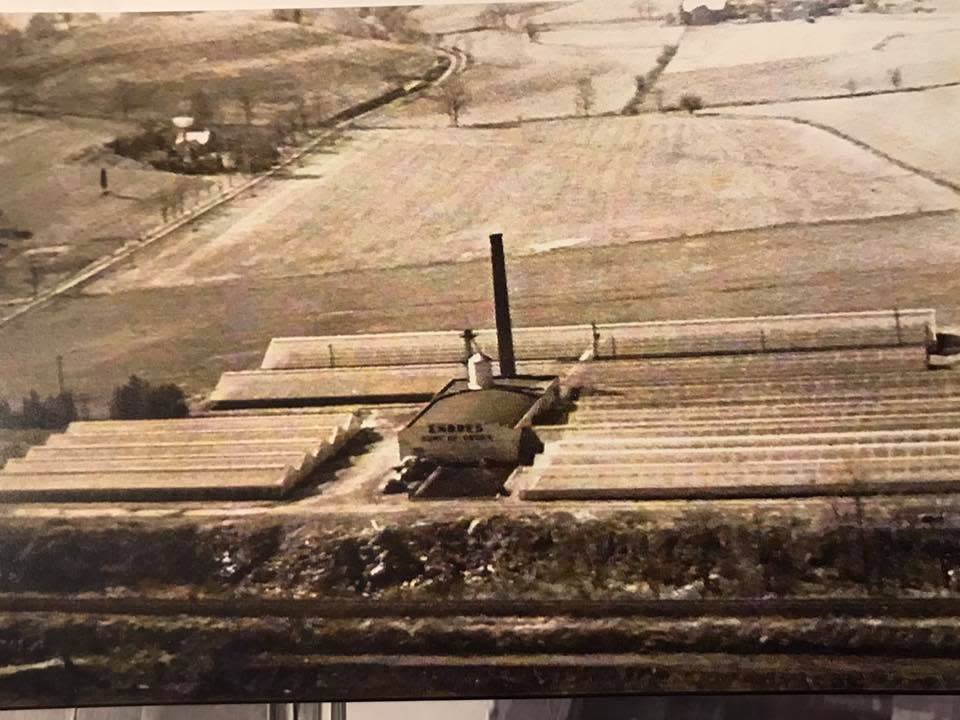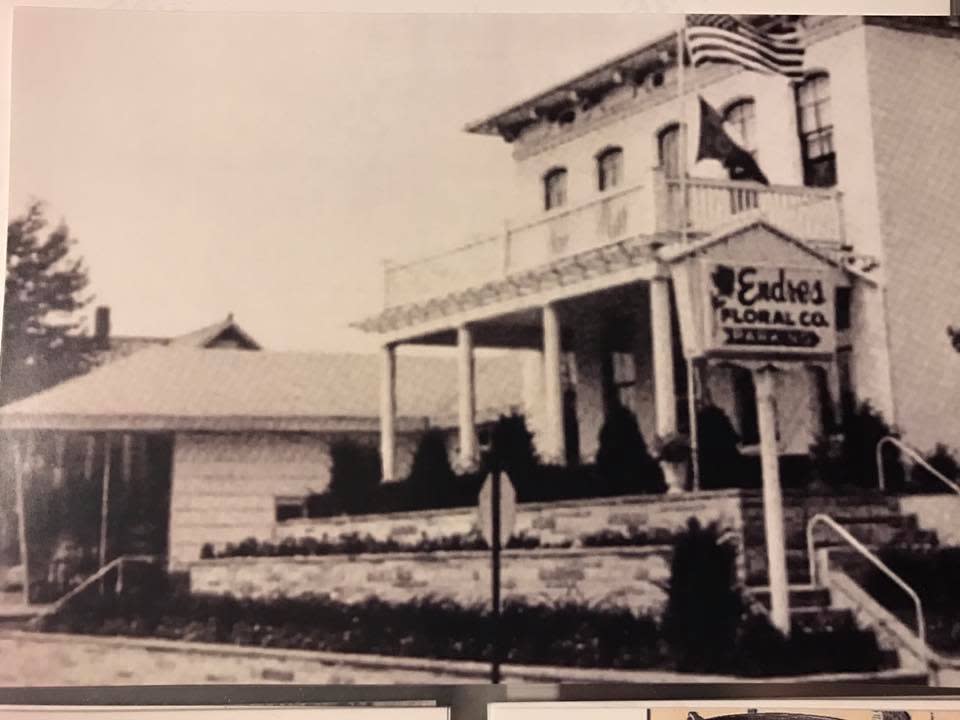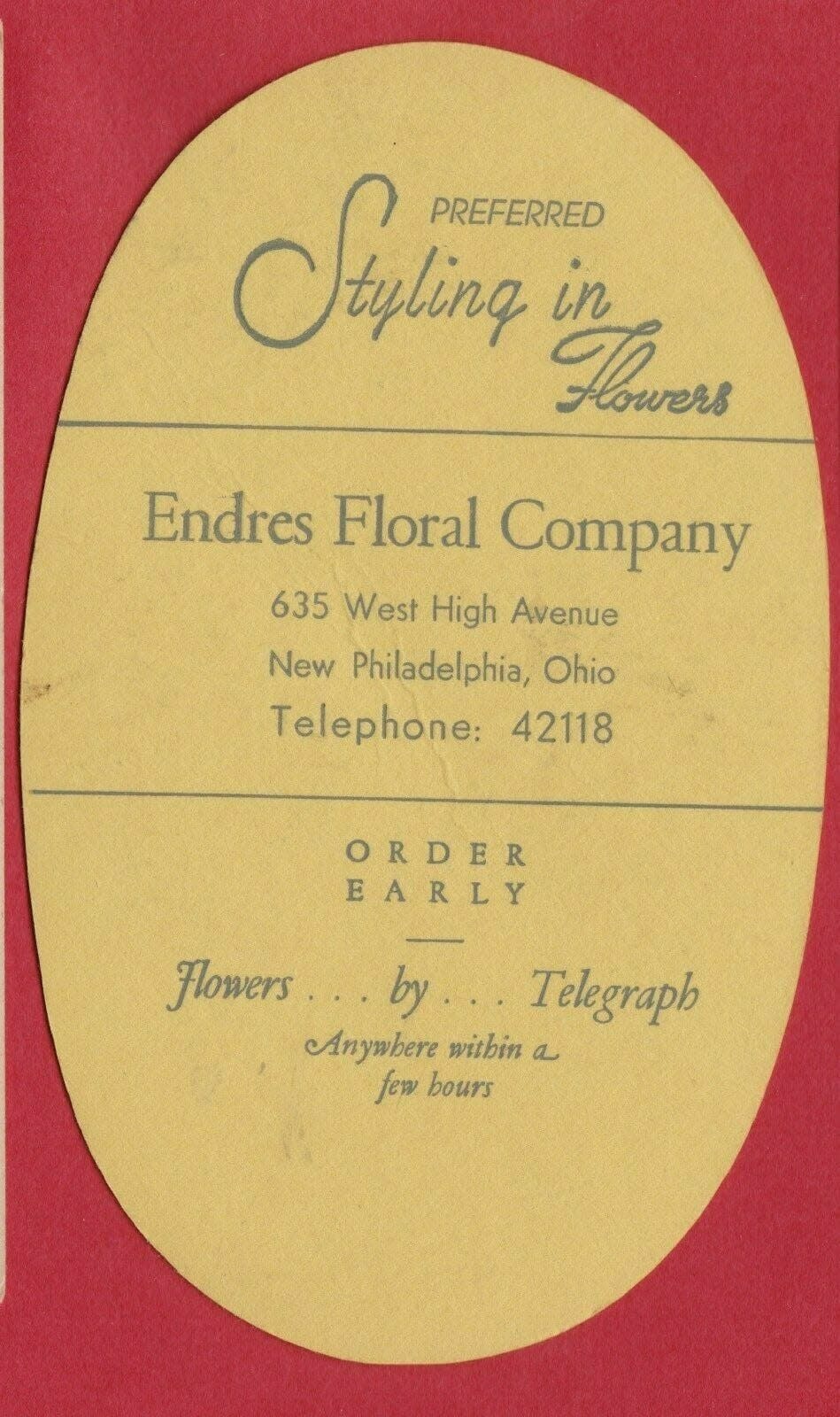Hooked on History: Endres Floral Co. was innovator in rose growing industry

The Endres Floral Co. of New Philadelphia was once the largest independent rose-growing operation in the eastern United States and enjoyed a worldwide reputation.
In 1960, the company's 70,000 rose bushes produced more than 1 million roses for the company. At peak periods of production, Endres employees gathered 10,000 roses each day for sale.
More local history: Hooked on History: Alpine-Alpa owner crusaded for Ohio Swiss cheese, mine reclamation
The Endres Floral Co. was started in 1913 by Louis P. Endres Sr., the son of German immigrants. His first greenhouse was on Fair Avenue, where the main branch of the Tuscarawas County Public Library now stands. The business moved to W. High Avenue in 1914.
Making deliveries by bicycle
Endres' wife, Magadalen, recalled the early days of the business in an interview with The Times-Reporter in 1979:
"The first deliveries were by bicycle, and we borrowed a cart when we had large pieces. He (Louis) shoveled all the coal by hand and he made himself a special bed in the greenhouse in the winter so he could nap during the night and still keep the fires going and the flowers warm. It was a great day when we put in a stoker and now they have gas."
Somewhere along the line, Endres was joined in the business by his brothers Frank, John and Michael.

In 1923, the company opened a greenhouse on an 88-acre property that the family owned on Pleasant Hill Road NW, just west of what is now the I-77/U.S. Route 250 interchange in New Philadelphia. According to the New Philadelphia Daily Times, the greenhouse was 50 feet wide and 400 feet long and housed 13,000 rose plants. Two more greenhouses followed in 1927.
During the Great Depression, the Endres Floral Co. started an annual flower show, held during the month of November at its headquarters at 635 E. High Ave. The final day of the four-day show in 1933 attracted more than 5,000 people.
Using corn cobs for mulch
Endres was an innovator in the floral industry.
For decades, growers had used barnyard manure for mulch, but around 1940 the supply of manure began to dwindle. In response, Endres began to use corn cobs, grinding them up for mulch. He found that he started getting better roses.
In decomposing, the cobs released sugar, boron and other beneficial substances into the soil. This extended the life of the plants from four years to eight to 10 years.
Endres died on April 28, 1951, and his son Gene succeeded him as president of the company, running it for the next 37 years.
Gene Endres was known as the "Rose Man" because he was never without a pocketful of rosebuds to present to visitors. He was noted for successfully lobbying to have the rose declared a national flower and was instrumental in establishing the Ohio State University College of Agriculture's first endowed chair. He was inducted into the Ohio Agriculture Hall of Fame in 1992.
An article in the Dover Daily Reporter in 1960 described how the company developed its famous roses.
Horticulturists experimented with plants until they achieved certain vivid colors. The plants were then shipped to California where the Endres variety was budded onto hardy root stock. The buds developed into shoots and the shoots into plants, which were then returned to New Philadelphia.

In 1963, a yellow rose developed by the Endres Floral Co., "Golden Memories," was named the official flower of Tuscarawas County. The name of the rose and its designation were announced at a dinner party at the Hotel Reeves in New Philadelphia for news media representatives, employees and family members. The rose had been developed over a 10-year period by Gene Endres and Mike Ravine of Dover.
Latin American imports take their toll
The company continued to grow through the decades. By 1986, Endres Floral Co. had 41 full-time and 11 part-time employees in the growing, retail and wholesale business and had 27 greenhouses. But it faced new headwinds from the changing floral market.
By that time, imported roses from places like Colombia, Ecuador and Israel were flooding the U.S. market. Colombia alone was sending 30 million roses a month into the U.S. There was only a 6% import duty on those roses. In comparison, European countries imposed a 25% import duty.
Colombia and Ecuador possessed several natural advantages, including direct equatorial sun, humidity and a 12-month growing season. This enabled them to produce higher quality rose color and longer stems with a shorter time to maturity.
Brothers Bill and Lou Endres, who were running the company in 1990, told The T-R that they were confident that a quality product would win out in the end.
"That was the reason the foreign car made such an initial impact," Bill said. "The public perceived that the foreign import was better. It is up to the domestic producer to show we are producing a better rose, and we believe we will."
Last days of the company
But the low cost of imported roses from Latin America finally took their toll on Endres.
Endres closed its 15,000-square-foot retail floral center at 635 W. High Ave. in August 1995. The property was sold and the buildings were torn down. A branch of the Commercial & Savings Bank is now located there.
In 2002, the U.S. Department of Commerce certified Endres Floral Co. as being negatively impacted by the trade practices of its own government. Endres worked with the Great Lakes Trade Adjustment Assistance Center through the University of Michigan at Ann Arbor for assistance. The organization concluded that growing cut flowers in the United States and roses in particular was no longer economically viable, particularly in the Midwest.
So Endres closed its plant-growing operation in 2003 and later sold its greenhouse operations at 1401 Pleasant Hill Road NW to developers. The company went out of business in 2004.
Jon Baker is a reporter for The Times-Reporter and can be reached at jon.baker@timesreporter.com.
This article originally appeared on The Times-Reporter: Endres Floral Co. of New Philadelphia enjoyed worldwide reputation

